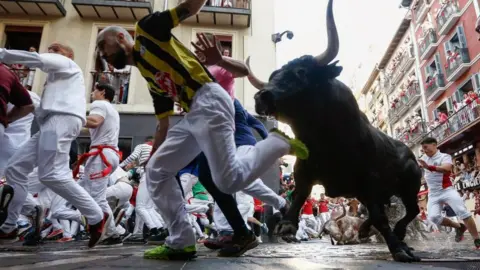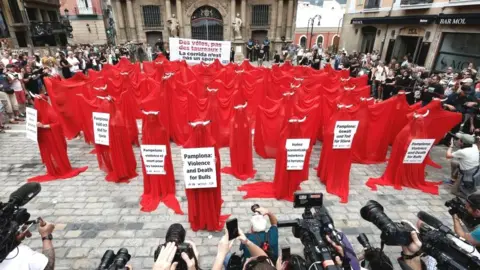Spain’s bull run tackles sexual assaults head on
 EPA
EPAIt's been 100 years since American author Ernest Hemingway immortalised Pamplona's bull-running festival, but in recent years the event has been overshadowed by an act of sexual violence that has stunned Spain.
In 2016, a young woman was gang-raped at the San Fermin festival in northern Spain by a group of five men known as the "wolf pack".
The case inspired widespread anger and protests against sexual assault laws in Spain after the men were originally only found guilty of sexual abuse. They were eventually convicted of rape in 2019.
The authorities have since been grappling with how to make the festival safer for women, especially at night, given the festival is known for its round-the-clock revelry.
"At night you see more single men out, young men, and sometimes respect goes out of the window, and alcohol plays a part, so at four in the morning you feel less safe," said Maite Monreal, a 31-year-old from Pamplona who has attended the 10-day festival throughout her life.

Edurne, her 29-year-old sister, says they are not just concerned about unwanted groping.
"You have verbal abuse as well and you can see everywhere people that talk to you like there's no rules," she said. "It may be Sanfermines [festival] but there are rules."
The "wolf pack" case, which contributed to an overhaul of sexual assault legislation in Spain, led authorities in Pamplona to clamp down on all forms of sexual assault - physical and verbal - during the festival.
Security was reinforced and information points set up to offer people guidance on how to make a complaint.
"Pamplona will not tolerate any kind of sexist attack," said the city's mayor, Cristina Ibarrola, at the beginning of this year's festival.
The regional government of Navarre has led a poster and video campaign against sexual assault featuring local role models - the singer Kutxi Romero, the Basque pelota player Unai Laso and the footballer Aimar Oroz.

Maite and Edurne agree that such efforts are paying off.
"If you make a complaint you are listened to - before, you wouldn't get listened to, the problem was not visible and so it could get covered up," said Maite. "But now it is visible it gets dealt with much more."
On Monday, hundreds of locals turned out in Pamplona's Plaza del Castillo to express their condemnation of an alleged rape that was reported at the beginning of this year's festivities, showing how the issue remains very much alive in the city.
However, the San Fermin festival is also facing pressure on another front, as animal rights activists denounce the treatment of bulls during the festivities.
In the morning bull run, six bulls and six tame bullocks are released onto the streets and they gallop through Pamplona's old town, as participants run ahead of or alongside the animals, until they reach the bullring. The bulls are killed in bullfights held every evening.
At the beginning of this year's festivities, protesters dressed in red robes and horns filled the city's main square, demanding an end to bullfights in the city in what has become a regular sight.
 EPA
EPA"We need a debate among all the people involved in the fiesta regarding what Sanfermines should be in the future," said Iván Pastor, who is part of Iruñea Antitaurina, a local anti-bullfighting organisation.
"We just want to ban the cruel traditions," he added.
Polls show increasing numbers of Spaniards oppose bullfighting and the controversial practice has stopped in some parts of the country, such as Catalonia and the Canary Islands.
However, Iván Pastor does not expect the same to happen in Pamplona any time soon. Unlike in other cities, he says, many people go to bullfights here more for the festive atmosphere than to admire the spectacle.
"Bullfighting will finish when the bullring is empty and right now, the bullring is full every day [of the festival]," he said.
